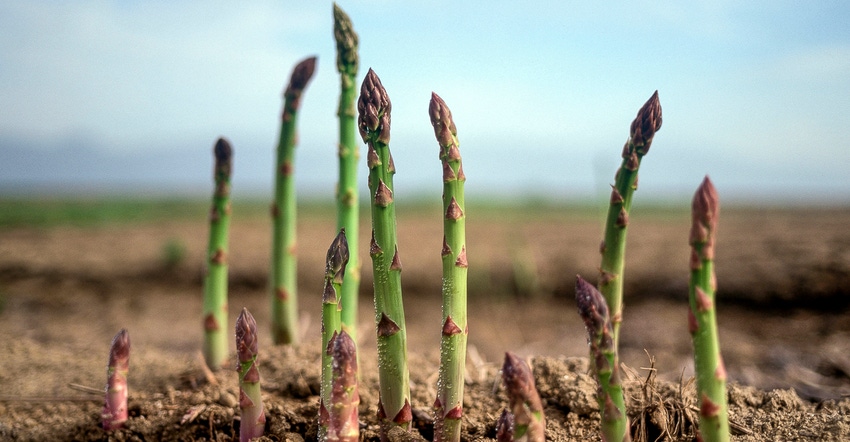
Declining asparagus acreage in California since passage of the North American Free Trade Agreement is largely to blame for a decision by the state's remaining growers to suspend activities of the California Asparagus Commission at the end of the year.
The decision to suspend rather than completely shut down the commission was calculated, according to commission Executive Director Cherie Watte. Suspending the commission will allow growers to reinstate its activities later without having to get new legislative support to do so, she said.
Foreign competition from Mexico is the primary reason California acreage has declined. In 2007 California growers harvested 58 million pounds of fresh asparagus from 20,000 acres. That fell to just over 20 million pounds of production from 8,000 acres in 2016, according to the California Department of Food and Agriculture.
California counties growing asparagus in 2018 included Fresno, Monterey, San Joaquin, Kern and Imperial.
As California continued its steep decline in production from about 2009, states like Michigan and Washington increased production. For Michigan, that increase has been steady since 2010 while Washington, also in a steep decline after 2009, saw a significant production increase in 2016 and has basically maintained that level ever since, according to the U.S. Department of Agriculture.
Watte said California's decline began with NAFTA in the early 1990s. Since then the rising cost of labor for the perennial crop has grown tremendously in California. The proverbial "nail in the coffin" was the recent hike in minimum wage and changes in overtime law that previously exempted agricultural workers.
Joe DelBosque still grows asparagus near Los Banos, Calif., though he says his acreage in recent years has been cut in half because foreign competition can ship fresh asparagus into California cheaper than he can produce it.
To continue producing the crop, DelBosque transitioned to certified organic several years ago, which helped improve his margins, though he says he doesn't know how much longer that will work as Mexico is now growing organic asparagus.
"We'll now have pressure from them with our organic produce as well," DelBosque said.
DelBosque's crop will be in dormancy for the next several months, with his first harvest expected in February or March, at a time when Mexico dominates the marketplace, he said.
"Mexico dominates the first half of our season," he continued. "They're working on finding locations to continue their production into April, which if they're successful, will completely shut us out."
Much of Mexico's production is in the central and north, near Arizona. Some of the growing operations there are large, he says. DelBosque once spoke with a grower in central Mexico who had 4,000 acres of it.
"We can't compete with that," he added.
Watte, who's been with the California Asparagus Commission since 1999, said this loss of locally grown asparagus will affect ongoing efforts in California to source "local" food in various markets where there continues to be a push to find locally sourced products.
About the Author(s)
You May Also Like






